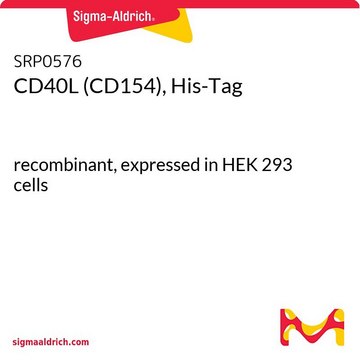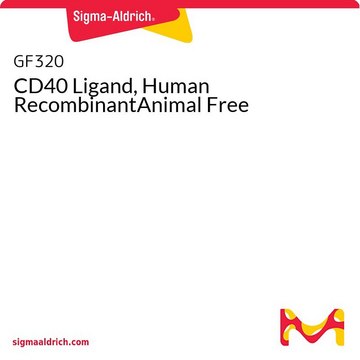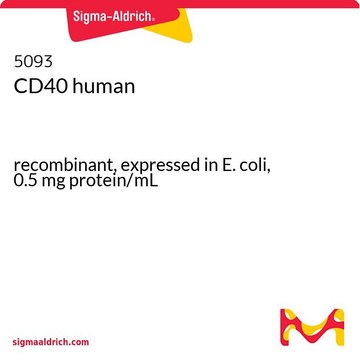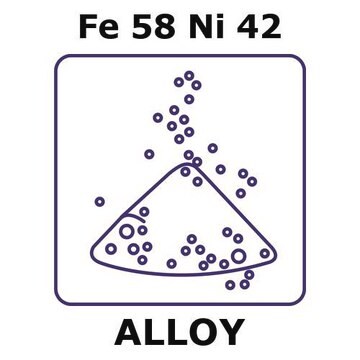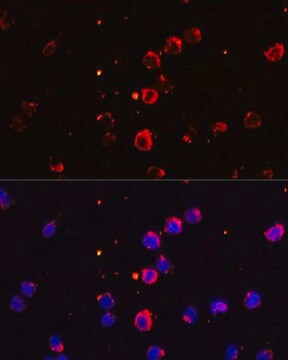SRP3306
SCD40 LIGAND
Animal-component free, recombinant, expressed in E. coli, ≥98% (SDS-PAGE), ≥98% (HPLC)
Sinonimo/i:
CD154, TNFSF5, TRAP, gp39
Autenticatiper visualizzare i prezzi riservati alla tua organizzazione & contrattuali
About This Item
Codice UNSPSC:
12352200
NACRES:
NA.77
Prodotti consigliati
Origine biologica
human
Ricombinante
expressed in E. coli
Saggio
≥98% (HPLC)
≥98% (SDS-PAGE)
Stato
lyophilized
Potenza
5-10 ng/mL ED50
PM
16.3 kDa
Confezionamento
pkg of 50 μg
Impurezze
endotoxin, tested
N° accesso UniProt
Condizioni di spedizione
wet ice
Temperatura di conservazione
−20°C
Informazioni sul gene
human ... TNFSF5(959)
Descrizione generale
CD40, a member of the TNF receptor superfamily, is a cell surface protein expressed on B cells, dendritic cells, monocytes, thymic epithelial cells and, at low levels, on T cells. Signaling though CD40 plays an important role in the proliferation and differentiation of B cells, and is critical for immunoglobulin (Ig) class switching. The membrane-anchored CD40-Ligand is expressed almost exclusively on activated CD4+ T lymphocytes. Failure to express CD40L leads to “immunodeficiency with hyper-IgM”, a disease characterized by failure to produce IgG, IgA and IgE. The human CD40L gene codes for a 261 amino acid type II transmembrane protein, which contains a 22 amino acid cytoplasmic domain, a 24 amino acid transmembrane domain, and a 215 amino acid extracellular domain. The soluble form of CD40L is an 18 kDa protein comprising the entire TNF homologous region of CD40L and is generated in vivo by an intracellular proteolytic processing of the full length CD40L. Recombinant human soluble CD40 ligand is a 16.3 kDa protein containing 149 amino acid residues comprising the receptor binding TNF-like domain of CD40L.
Azioni biochim/fisiol
CD40, a member of the TNF receptor superfamily, is a cell surface protein expressed on B cells, dendritic cells, monocytes, thymic epithelial cells and, at low levels, on T cells. The soluble form of CD40L is an 18 kDa protein comprising the entire TNF homologous region of CD40L and is generated in vivo by an intracellular proteolytic processing of the full length CD40L. Recombinant human soluble CD40 ligand is a 16.3 kDa protein containing 149 amino acid residues comprising the receptor binding TNF-like domain of CD40L.
Stato fisico
Lyophilized from 10mM Sodium Phosphate, pH 7.5.
Ricostituzione
Centrifuge the vial prior to opening. Reconstitute in water to a concentration of 0.1-1.0 mg/ml. Do not vortex. This solution can be stored at 2-8°C for up to 1 week. For extended storage, it is recommended to further dilute in a buffer containing a carrier protein (example 0.1% BSA) and store in working aliquots at -20°C to -80°C.
Codice della classe di stoccaggio
11 - Combustible Solids
Classe di pericolosità dell'acqua (WGK)
WGK 3
Punto d’infiammabilità (°F)
Not applicable
Punto d’infiammabilità (°C)
Not applicable
Scegli una delle versioni più recenti:
Certificati d'analisi (COA)
Lot/Batch Number
Non trovi la versione di tuo interesse?
Se hai bisogno di una versione specifica, puoi cercare il certificato tramite il numero di lotto.
Possiedi già questo prodotto?
I documenti relativi ai prodotti acquistati recentemente sono disponibili nell’Archivio dei documenti.
Contribution of surface localization to platelet activation by CD154 antibodies and introduction of a novel approach for studying immune complex activity.
Meghan Hatfield et al.
Thrombosis research, 127(6), 571-575 (2010-01-20)
D Hollenbaugh et al.
The EMBO journal, 11(12), 4313-4321 (1992-12-01)
Signals delivered to B cells via CD40 can synergize with those provided by other B cell surface receptors to induce B cell proliferation and antibody class switching as well as modulate cytokine production and cell adhesion. Recently, it has been
Il team dei nostri ricercatori vanta grande esperienza in tutte le aree della ricerca quali Life Science, scienza dei materiali, sintesi chimica, cromatografia, discipline analitiche, ecc..
Contatta l'Assistenza Tecnica.